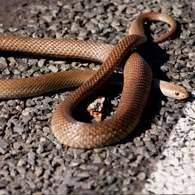Vet's warning over waking snakes

Early spring-like weather is attracting venomous snakes out of hibernation, pet owners are being warned.
As they are still sluggish this time of year, they are more likely to bite if cornered or harassed by a dog or cat rather than slither away.
Dr Jill Griffiths of the Murdoch Pet Emergency Centre (MPEC) said owners should be on the lookout for snakes and be aware of symptoms and emergency responses.
"Snake bites are relatively common summertime emergencies that can be fatal. Factors such as the number of times your pet is bitten, how long it has been since the snake last fed and how long it takes before you seek medical attention really dictate how severe your pet's reaction will be," Dr Griffiths said.
"We encourage anyone who suspects their pet has come into contact with a snake to take them to a veterinarian immediately. In most cases, bites are difficult to detect and don't show overt swelling or bleeding."
Dr Griffiths said the most immediate reactions to a bite were trembling, rapid breathing, vomiting, defecation, and/or collapse. Following this, animals may appear to recover, but then the pupils may dilate and the animal's gait will become clumsy as the legs become progressively weaker.
If the dose of venom is large enough, complete paralysis will occur followed by death if untreated with anti-venom.
"If treated immediately, pets have a very good chance of survival and recovery. The best course of action is to keep your pet as calm and still as possible and get them to help," Dr Griffiths said. "We recommend that you do not take a "wait and see" approach to snakebite.
"In more severe cases, we've had to put pets on life support in the Intensive Care Unit until they are strong enough to breathe on their own again."
The most common types of bite in the Perth area for domestic pets are western brown snakes, dugites and tiger snakes. Death adder bites are seen mainly from the Perth Hills areas.
Owners are urged to keep their pets on a leash in areas such as dunes, long grass, bushland and along rivers.
"Keeping your property well maintained – trimming long grass and avoiding clutter – can go a long way to protecting the area in which pets spend most of their time. It also makes good sense for children and owners' safety too," Dr Griffiths said.
Provided by Murdoch University

















